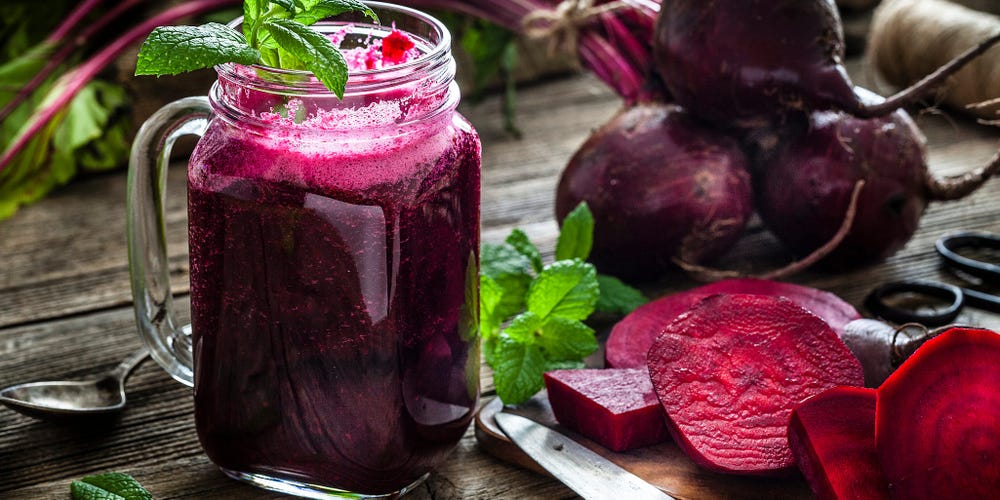Beets are not a staple in the diets of many people, but they probably should be. These unusual root vegetables may provide a slew of health benefits, ranging from blood pressure reduction to enhanced athletic performance. Additionally, they contain a variety of nutrients and compounds that are not found in a great deal of other foods.
Beets are a simple vegetable to incorporate into your diet, whether you add them to a salad or drink beet juice. Here are six reasons why you should consume beets.

1. Beets have been shown to help lower blood pressure.
Nitrates are found in beets, which the body converts to nitric oxide. Nitric oxide acts as a vasodilator, relaxing and widening blood vessels, which can help lower blood pressure, according to Dana Hunnes, PhD, MPH, RD, senior dietitian at the Ronald Reagan UCLA Medical Center and professor at the Fielding School of Public Health at UCLA.
A 2015 small study discovered that drinking 250 mL of beetroot juice daily for four weeks was sufficient to lower blood pressure in hypertensive patients. According to a small 2014 study, beets can also help lower blood pressure in older, overweight individuals.
2. Beets have anti-inflammatory properties.
Beets’ dark red color is due to betalain, an antioxidant phytonutrient produced by plants. According to Hunnes, betalain is anti-inflammatory due to its ability to inhibit the cyclooxygenase-2 (COX-2) enzyme, which is associated with inflammation.
Chronic inflammation can damage healthy tissue and raise your risk of developing long-term health problems such as heart disease, cancer, diabetes, and Alzheimer’s disease. “Chronic inflammation is akin to iron rusting,” Hunnes explains. “If you do not remove the rust and continue to expose it to the elements, it will degrade.”
In a small 2016 study, researchers discovered that after two weeks of supplementation with either cooked beets or raw beet juice, those with high blood pressure experienced an improvement in systemic inflammation. Raw beet juice was even more effective than cooked beets at reducing inflammation.
3. Beets may help with weight loss.
When attempting to lose weight, it can be extremely beneficial to consume filling foods in order to feel full and avoid overeating.
“Beets are a good source of water and fiber. This can help you feel fuller for longer periods of time and stay more hydrated, which can also help with [feeling full] “According to Hunnes.
Additionally, Hunnes notes that beets are low in calories and contain a reasonable amount of protein for a root vegetable, making them a healthy choice for anyone trying to lose weight. For instance, one cup of beets contains the following:
- 3.81 grams of fiber
- 2.19 g of protein
- 58.5 calories
4. Beets can help with pooping.
Beets’ high fiber and water content also aid in digestion, according to Hunnes. Fiber promotes regular bowel movements by bulking up your stool, making constipation less likely.
Fiber can increase stool frequency, according to a 2012 meta-analysis of five different studies. Additionally, fiber may aid in the prevention of digestive disorders such as colon cancer, gastroesophageal reflux disease, and diverticulitis.
5. Beets may be good for your brain.
Due to the fact that beets can help lower blood pressure, they can also help reduce the risk of stroke and other neurological problems.
“When blood pressure is elevated, the risk of stroke and other cognitive declines increases. Thus, lowering blood pressure benefits both the patient and the brain by increasing the ease and amount of blood that reaches the brain “According to Hunnes.
Beet nitrates may also contribute to brain health. Nitrates increased blood flow to critical regions of the brain, such as the frontal lobe, which is associated with attention and working memory, according to a 2011 study of older adults.
6. Beets may improve athletic performance.
Beet nitrates may also help athletes perform better due to their effect on the mitochondria, the part of the cell that produces energy. Nitrates, according to Hunnes, increase the efficiency of cellular mitochondria.
“Because mitochondria are required to produce energy in your cells, anything that increases their efficiency benefits athletic performance,” Hunnes explains.
A small 2016 study discovered that betalain-rich beet concentrate can help competitive runners perform better. Individuals who consumed the beet concentrate reported less perceived exertion than those who received a placebo. Additionally, they had a decreased increase in lactate dehydrogenase, a marker of muscle damage. Another small study published in 2019 discovered that nitrates derived from beetroot juice reduced muscle fatigue.
You do not have to consume beets on a consistent basis to reap these benefits. Even a single serving of beets prior to a workout can benefit you, Hunnes says. Nitrate levels in the blood reach a peak two to three hours after consumption, so consume the beets two to three hours before exercise. She recommends 300 milligrams of the active ingredients, which is approximately 1.5 cups of beet juice.
Beets’ dangers
As with any food, excessive consumption of beets may result in some health complications. Overconsumption carries the following risks:
Increased risk of kidney stones: Because beets contain a high concentration of the compound oxalate, eating too many can contribute to the formation of kidney stones.
Beeturia: Beeturia can cause the urine to turn pink or red. Additionally, the stool may discolor. Though strange, this is a harmless symptom that will resolve once you reduce or eliminate your beet consumption.
Beets may aggravate gout. If you have gout, you may want to avoid beets. Beets’ oxalate content may cause an increase in uric acid, aggravating gout.
If you are unsure whether beets are safe to eat or how much is safe for you to consume, consult your primary physician.
The gist
Beets are nutrient-dense and may help fight inflammation and prevent some chronic diseases. Beets can provide numerous health benefits when included in a colorful, nutritious diet.

